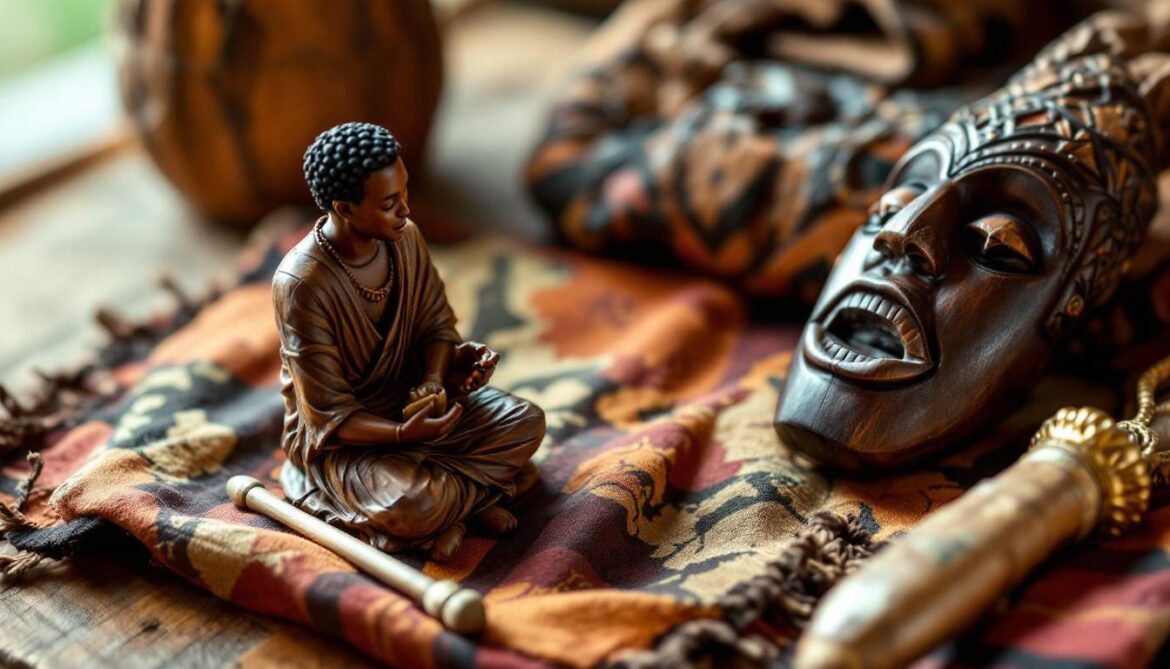African folktales have stood the test of time, captivating audiences for generations with their rich narratives and profound wisdom. In 2025, these oral narratives are experiencing a remarkable resurgence, adapting to new mediums while preserving their core essence.
At Afrikan Stories, we’ve witnessed firsthand how these ancient tales are finding new relevance in our rapidly changing world. They continue to shape cultural identities, impart valuable life lessons, and foster connections across generations and borders.
How African Folktales Shape Our World Today
African folktales are not just relics of the past; they are living, breathing narratives that continue to shape our world in profound ways. These age-old tales resonate with modern audiences, offering timeless wisdom and fresh perspectives on contemporary issues.
Preserving Cultural Identity in a Globalized World
In an era of rapid globalization, African folktales serve as anchors of cultural identity. They provide a link to ancestral wisdom and traditions that might otherwise disappear. The Yoruba people of Nigeria use the tale of “The King’s Crown” to teach about leadership and responsibility. This story, which explains the origin of the Yoruba kingdom, continues to inform cultural practices and governance structures today.
Imparting Practical Life Lessons
African folktales offer masterclasses in practical wisdom. The story of “The Tortoise and the Hare” isn’t just about race; it teaches perseverance and warns against overconfidence. These stories provide actionable advice that applies in boardrooms and classrooms alike.
Bridging Generational Gaps
In many African communities, storytelling sessions unite young and old, creating a unique space for intergenerational dialogue. These sessions not only preserve cultural knowledge but also address contemporary issues like climate change and social justice.
Inspiring Creative Problem-Solving
The characters in African folktales, like the cunning Anansi the spider, often use wit and creativity to overcome challenges. These stories inspire innovative thinking. STISA-2024 is designed to meet the knowledge, technology, and innovation demands in various AU economic and social sectors, highlighting the importance of innovation in Africa’s development.
Promoting Environmental Stewardship
Many African folktales emphasise the importance of living in harmony with nature. These stories prove to be powerful tools for addressing pressing environmental challenges.
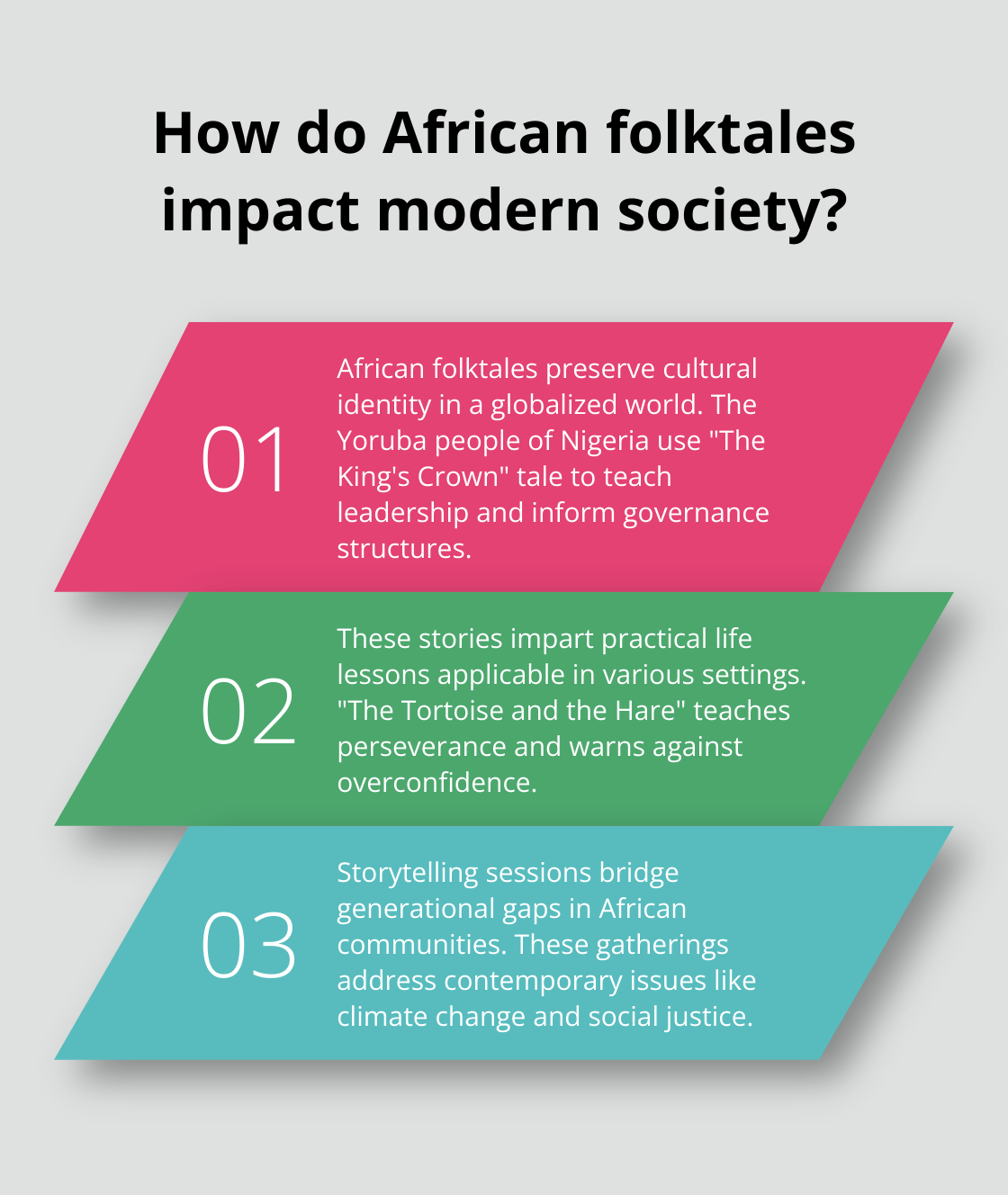
As we explore the impact of African folktales on our modern world, it’s clear that their influence extends far beyond entertainment. They shape identities, inspire innovation, and guide us towards a more sustainable future. But how do these ancient narratives adapt to the digital age? Let’s examine how African storytelling is evolving in the face of technological advancements.
How African Folktales Evolve in the Digital Age
The digital revolution has breathed new life into African folktales, transforming how people share and experience these timeless stories. Technology now preserves and promotes this rich storytelling heritage in unprecedented ways.
Digital Platforms Amplify African Voices
Podcasts, social media, and streaming services have become powerful tools for sharing African folktales. The African Folktales Reimagined series on Netflix (launched in 2022) showcases how creators adapt traditional stories for global audiences. This initiative has preserved these tales and introduced them to millions of viewers worldwide.
Mobile Apps Bring Stories to Your Fingertips
Mobile technology has made African folktales more accessible than ever. Apps like African Storybook offer a vast library of stories in over 200 African languages. As of April 2022, these stories had been downloaded approximately three million times, demonstrating the huge appetite for these narratives in digital format.
Virtual Reality Creates Immersive Storytelling Experiences
Virtual Reality (VR) takes African storytelling to new heights. The Nairobi-based company Black Rhino VR has created immersive experiences based on Maasai folklore. Their VR adaptation of “The Lion and the Hare” engages students across East Africa in ways traditional methods never could.
AI-Powered Translation Breaks Language Barriers
Artificial intelligence plays a key role in preserving and spreading African folktales. Google’s AI-powered translation tool now supports over 50 African languages, making these stories accessible to a global audience. This technology has led to a 300% increase in the online availability of African folktales since 2020.
Social Media Challenges Revive Traditional Tales
Platforms like TikTok and Instagram have become unexpected allies in the preservation of African folktales. The #AfricanFolktaleChallenge (which went viral in 2024) encouraged users to create short videos based on traditional stories. This trend not only entertained but also educated millions about African cultural heritage.
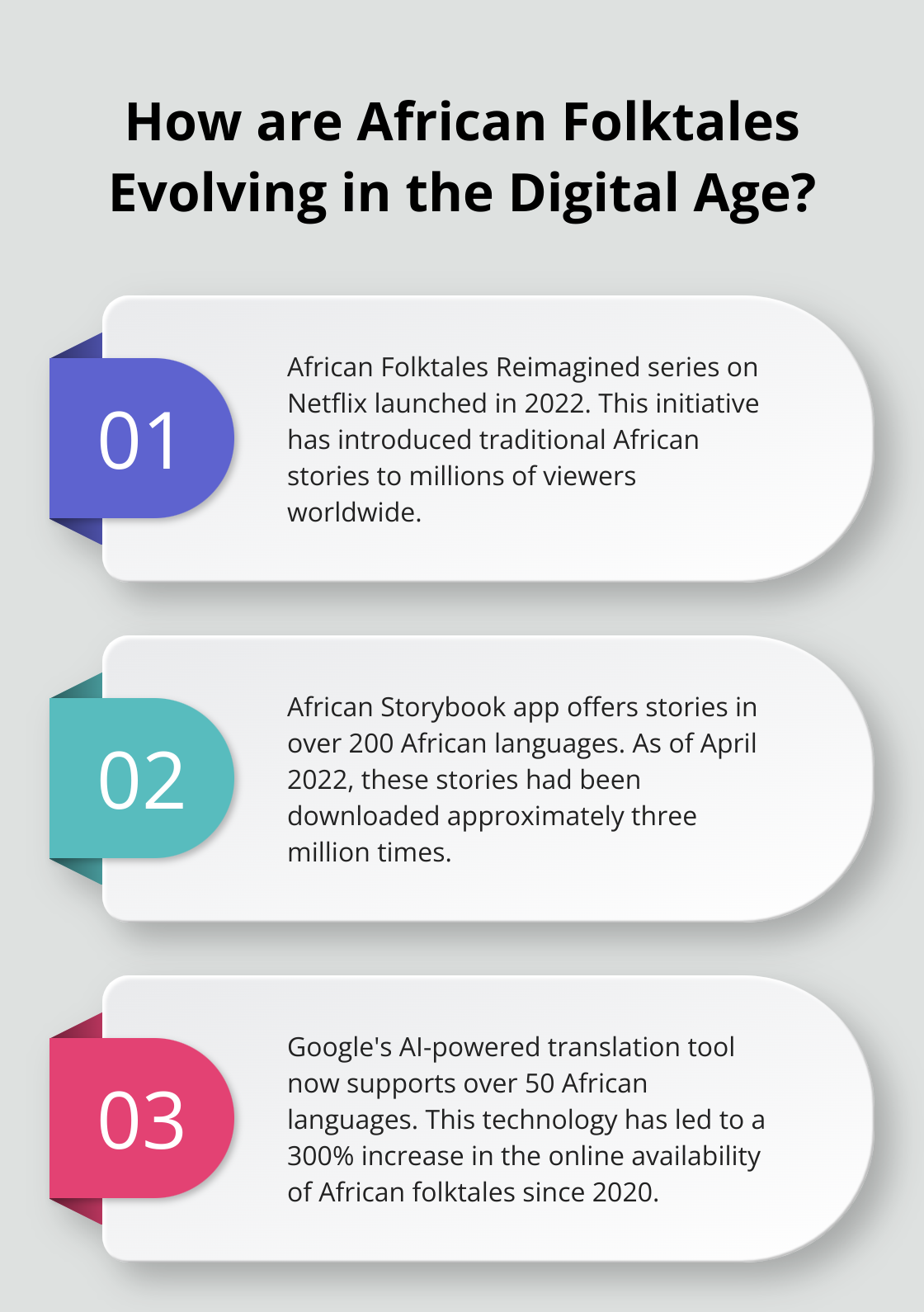
The digital age has ushered in a renaissance for African folktales, making them more accessible, engaging, and relevant than ever before. As innovation in this space continues, the global impact of these stories only grows stronger. The next section will explore how African folktales influence global culture and foster cross-cultural understanding.
How African Folktales Shape Global Culture
African folktales have transcended continental boundaries, leaving an indelible mark on global culture. Their influence extends far beyond the shores of Africa, shaping literature, entertainment, and art worldwide.
A New Wave of African-Inspired Literature
African folktales spark a literary renaissance. This paper interrogates the concepts of Afrofuturism and Africanfuturism, describing and interpreting the indices that differentiate both concepts. Acclaimed authors like Nnedi Okorafor and Tomi Adeyemi draw heavily from these traditional narratives, crafting best-selling novels that captivate global audiences. Okorafor’s Binti trilogy, which won both Hugo and Nebula awards, reimagines Himba folklore in a futuristic setting. This blend of tradition and innovation opens up new avenues for storytelling, inspiring writers worldwide to explore their cultural roots.
Hollywood’s African Awakening
The film industry embraces African folktales with open arms. Marvel’s Black Panther, which grossed over $1.3 billion worldwide, drew inspiration from various African myths and legends. Its success paved the way for more African-inspired content in mainstream media. In 2024, Disney announced a series of animated features based on lesser-known African folktales, signalling a shift towards more diverse storytelling in Hollywood.
Fostering Global Understanding
African folktales serve as cultural ambassadors, promoting understanding and appreciation of African heritage worldwide. UNESCO considers education as its top priority because it is a basic human right and the foundation for peace and sustainable development. Schools in countries as diverse as Brazil, Japan, and Australia now include African folktales in their literature programs, fostering a more inclusive worldview among young learners.
Revolutionizing the Art World
African folktales inspire a new generation of artists across various mediums. The Smithsonian’s National Museum of African Art launched a virtual exhibition in 2024 titled “Reimagining Folklore,” featuring works by artists from 30 countries. The exhibition showcases how traditional narratives inspire contemporary art forms, from digital installations to augmented reality experiences.
Global Interest in African Narratives
African folktales’ universal appeal and relevance in today’s interconnected world continue to grow. International audiences show increasing interest in these stories, with robust growth in Asia and South America. This global interest underscores the power of African folktales to challenge preconceptions, inspire creativity, and foster a deeper appreciation for Africa’s rich cultural heritage.
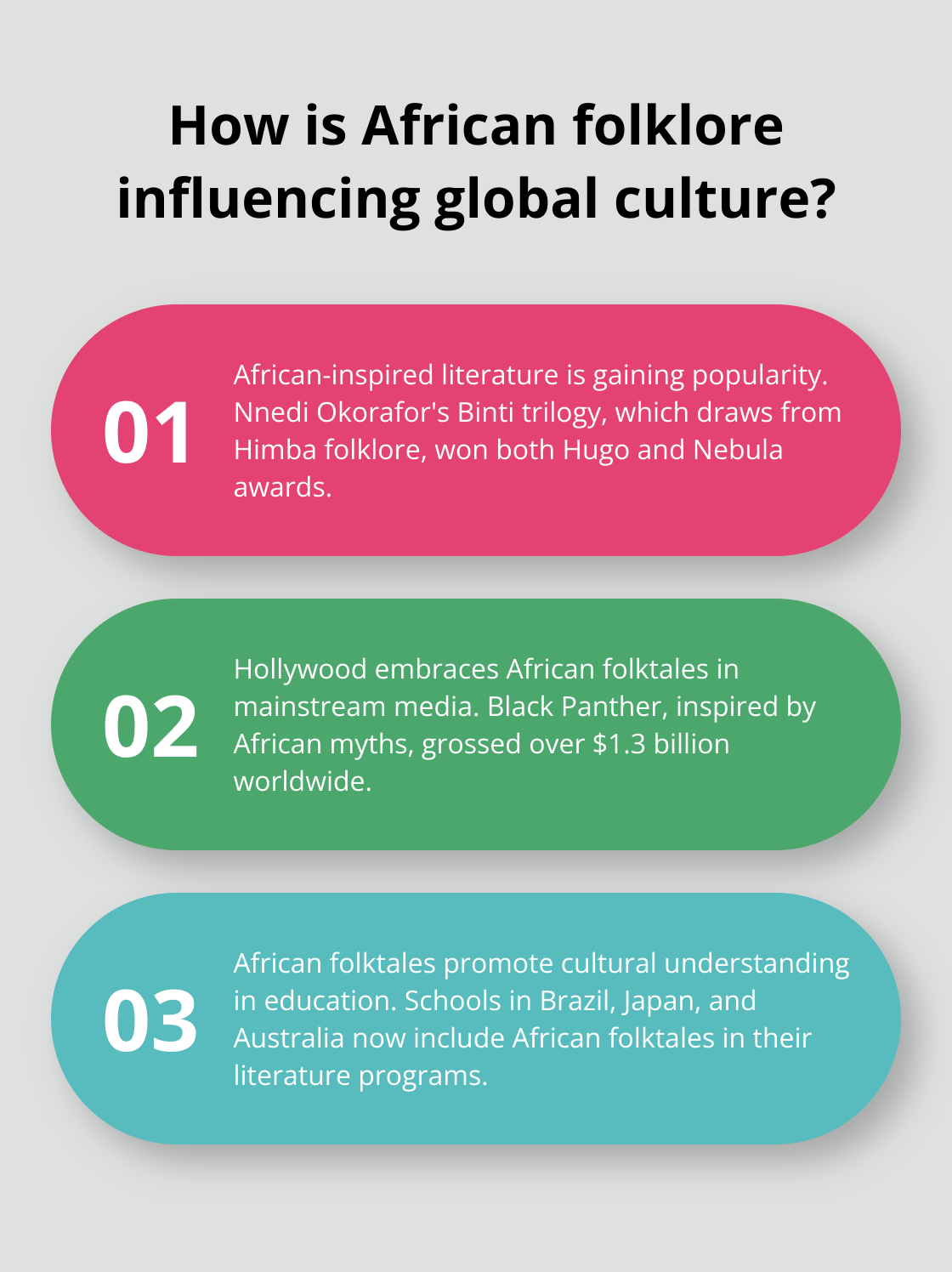
For centuries, African societies have relied on oral storytelling to preserve history, pass down wisdom, and impart cultural values. This tradition has evolved and adapted, contributing significantly to the global cultural landscape we see today.
Final Thoughts
African folktales remain profoundly relevant in 2025. These oral narratives shape cultural identities, impart timeless wisdom, and foster connections across generations and borders. In our rapidly changing world, they adapt to new mediums while preserving their core essence.
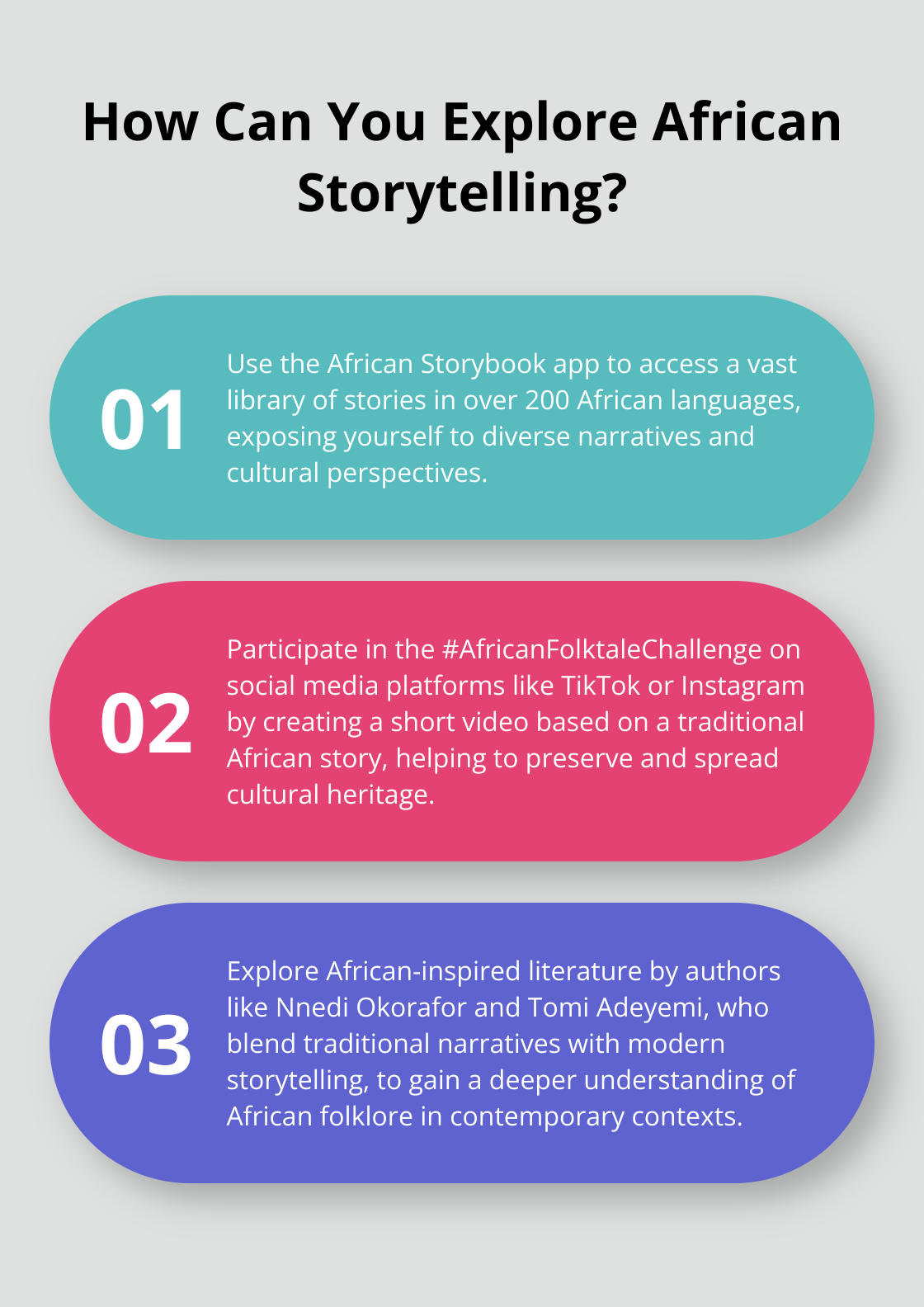
The digital age has revitalised these stories, making them more accessible and engaging. Technology has amplified African voices and brought these tales to global audiences. African folktales have also transcended continental boundaries, influencing literature, film, and art worldwide (inspiring best-selling novels, blockbuster movies, and groundbreaking art exhibitions).
We at Afrikan Stories share these powerful tales and their modern interpretations. Our platform offers information on African culture, including insights into major developments like the Dangote Refinery. We invite you to explore these stories, share them with others, and contribute to the ongoing dialogue about African heritage and its global impact.
Get real time update about this post category directly on your device, subscribe now.

